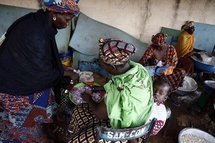Men's role vital in stopping female circumcision: experts
AFP
GENEVA- The fight to stop female genital mutilation in Africa will not be won without the involvement of men, experts and field researchers agreed ahead of Saturday's international day against the practice.
"If men decide to abandon the practice, it's sure and certain that women will follow suit, because for the moment I've not seen in Mali a single woman come forward to say, 'We have to circumcise our daughters," doctor and parliamentary deputy Omar Mariko said.

Women cooking in Mali, 2007 (AFP/File/Georges Gobet)
"If you want change, you have to work with the whole community," said Elise Johansen of the World Health Organisation. "But also, in many countries it was shown that men are to a higher extent than women against the practice, so therefore by involving them more, there is a bigger chance for change."
Johansen said that sometimes mothers and grandmothers wait until the father of the household is out before taking their daughter to be circumcised.
In Mali, more than 90 percent of women between 15 and 49 years old have had their genital organs mutilated, according to the WHO, which recalls that female genital mutilation affects between 120 and 140 million women in 28 countries, mostly in Africa and the Middle East.
"The female genital mutilation or cutting poses immediate and long-term problems for the health of women and girls and violates their human rights," the UN Children's Fund (UNICEF) said Friday.
UNICEF pointed out that mutilation causes intense pain, sometimes bleeding, and sometimes sterility or even death.
Mariko regretted that no law bans the practice in his country, but took hope from certain targeted initiatives, like a meeting organised with 200 traditional chiefs in the brotherhood of hunters. They were shown a film to make them more aware of the practice, and then talked all night.
"The hunters then picked up their fetishes and swore never again to have their daughters circumcised," Mariko said.
"In Africa, everything that relates to sexuality is taboo," said Mauritanian anthropologist Abdoulaye Sow. "Women have been forced to cope with it on their own bodies and their daughters' bodies, and have been responsible for it, whereas men have a more distant perception on the practice.
"But once they (men) get information on the health risks and they really understand what it is, they usually get shocked and they can react more negatively," Sow said.
Nevertheless, "men play a large part of responsibility: they demand virginity on the day of the marriage." Circumcision is seen in some cultures as a guarantee of virginity.
Popular beliefs hold that female genital mutilation prevents women from having children outside marriage, which is the height of scandal, and that it inclines them to carry out their Muslim prayers.
The struggle needs to be taken on cultural ground and not just the health terrain in Mauritania, where more than 71 percent of women are affected, the anthropologist said. The theme needs to be taken up in the native language of women and by using examples from their daily life.
-------------------------------------------------------------------------